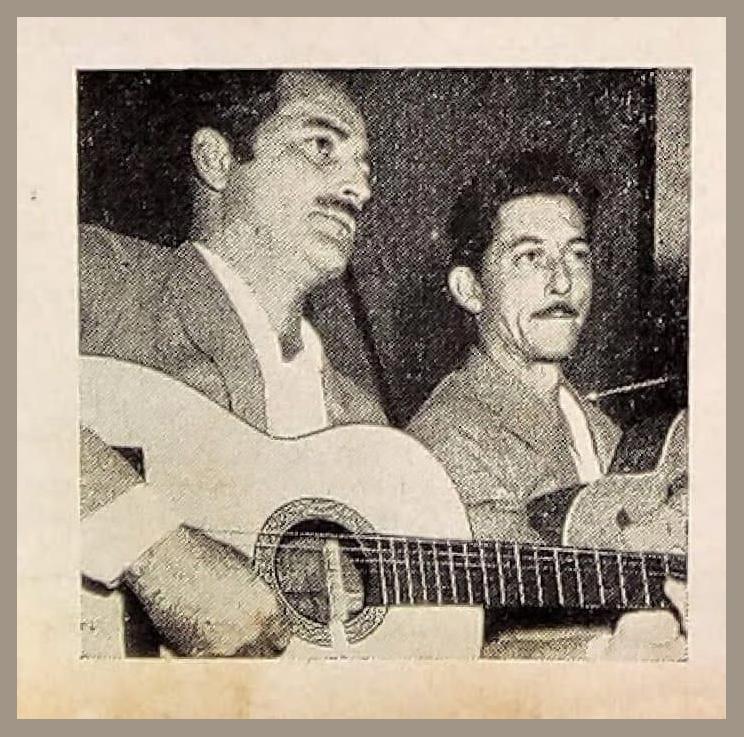 Vieira e Vieirinha
Vieira e Vieirinha
Vieira e Vieirinha: A Melodious Duo with a Controversial Past
The Brazilian folk-rock duo Vieira e Vieirinha, renowned for their captivating song "A Moça Que Dançou Com o Diabo" (The Girl Who Danced with the Devil), emerged on the music scene with both acclaim and controversy.
Origins and Challenges:
Born in the northeastern state of Bahia, Vieira (Evaldo Vieira) and Vieirinha (Evaldo Vieira Borges) began their musical careers as street performers. In 1972, they released their debut album, sparking controversy with the title track, "A Moça Que Dançou Com o Diabo." The song's explicit lyrics and heavy rock influence drew criticism from traditionalists and religious groups.
Undeterred, the duo persisted, earning a loyal following among Brazilian youth who embraced their raw and rebellious style.
Discography and Recognition:
Despite the initial controversy, Vieira e Vieirinha went on to release a string of successful albums, including "Deixa a Vida Me Levar" (1973), "Causos e Coisas Nossas" (1974), and "A Vida do Viajante" (1975). Their music became synonymous with the burgeoning counterculture movement in Brazil.
Members:
* Vieira (Evaldo Vieira): Lead vocals, guitar
* Vieirinha (Evaldo Vieira Borges): Backing vocals, drums
Controversies and Personal Struggles:
Vieira e Vieirinha's rebellious nature extended beyond their music. Vieira's outspoken criticism of social and political issues often landed him in hot water with authorities. Vieirinha, on the other hand, battled addiction throughout his life.
Despite their personal struggles, the duo remained a formidable force in Brazilian music. They performed countless live shows and became known for their energetic stage presence.
Later Years and Legacy:
In the 1990s, Vieira e Vieirinha reunited after a brief hiatus. They continued to tour and released a few more albums, but their glory days had passed. Vieirinha passed away in 2007 due to complications from alcoholism. Vieira continues to perform as a solo artist, paying tribute to the legendary duo that once ignited Brazil's musical landscape.
Conclusion:
Vieira e Vieirinha's music defied societal norms and pushed the boundaries of Brazilian folk and rock. Their controversial masterpiece, "A Moça Que Dançou Com o Diabo," remains an enduring testament to their rebellious spirit and the power of their unique musical chemistry. Despite the challenges and personal struggles they faced, their legacy continues to inspire generations of Brazilian musicians and fans alike.
The Brazilian folk-rock duo Vieira e Vieirinha, renowned for their captivating song "A Moça Que Dançou Com o Diabo" (The Girl Who Danced with the Devil), emerged on the music scene with both acclaim and controversy.
Origins and Challenges:
Born in the northeastern state of Bahia, Vieira (Evaldo Vieira) and Vieirinha (Evaldo Vieira Borges) began their musical careers as street performers. In 1972, they released their debut album, sparking controversy with the title track, "A Moça Que Dançou Com o Diabo." The song's explicit lyrics and heavy rock influence drew criticism from traditionalists and religious groups.
Undeterred, the duo persisted, earning a loyal following among Brazilian youth who embraced their raw and rebellious style.
Discography and Recognition:
Despite the initial controversy, Vieira e Vieirinha went on to release a string of successful albums, including "Deixa a Vida Me Levar" (1973), "Causos e Coisas Nossas" (1974), and "A Vida do Viajante" (1975). Their music became synonymous with the burgeoning counterculture movement in Brazil.
Members:
* Vieira (Evaldo Vieira): Lead vocals, guitar
* Vieirinha (Evaldo Vieira Borges): Backing vocals, drums
Controversies and Personal Struggles:
Vieira e Vieirinha's rebellious nature extended beyond their music. Vieira's outspoken criticism of social and political issues often landed him in hot water with authorities. Vieirinha, on the other hand, battled addiction throughout his life.
Despite their personal struggles, the duo remained a formidable force in Brazilian music. They performed countless live shows and became known for their energetic stage presence.
Later Years and Legacy:
In the 1990s, Vieira e Vieirinha reunited after a brief hiatus. They continued to tour and released a few more albums, but their glory days had passed. Vieirinha passed away in 2007 due to complications from alcoholism. Vieira continues to perform as a solo artist, paying tribute to the legendary duo that once ignited Brazil's musical landscape.
Conclusion:
Vieira e Vieirinha's music defied societal norms and pushed the boundaries of Brazilian folk and rock. Their controversial masterpiece, "A Moça Que Dançou Com o Diabo," remains an enduring testament to their rebellious spirit and the power of their unique musical chemistry. Despite the challenges and personal struggles they faced, their legacy continues to inspire generations of Brazilian musicians and fans alike.